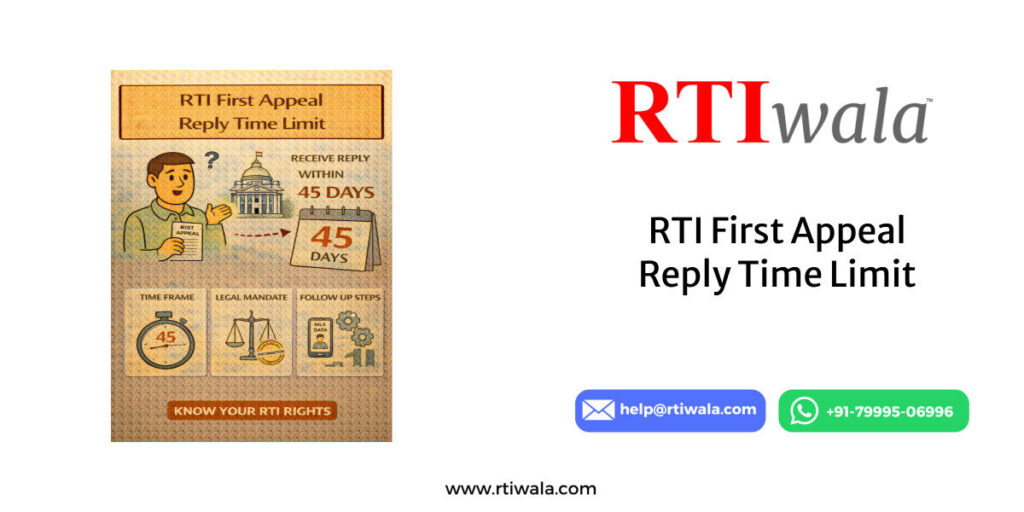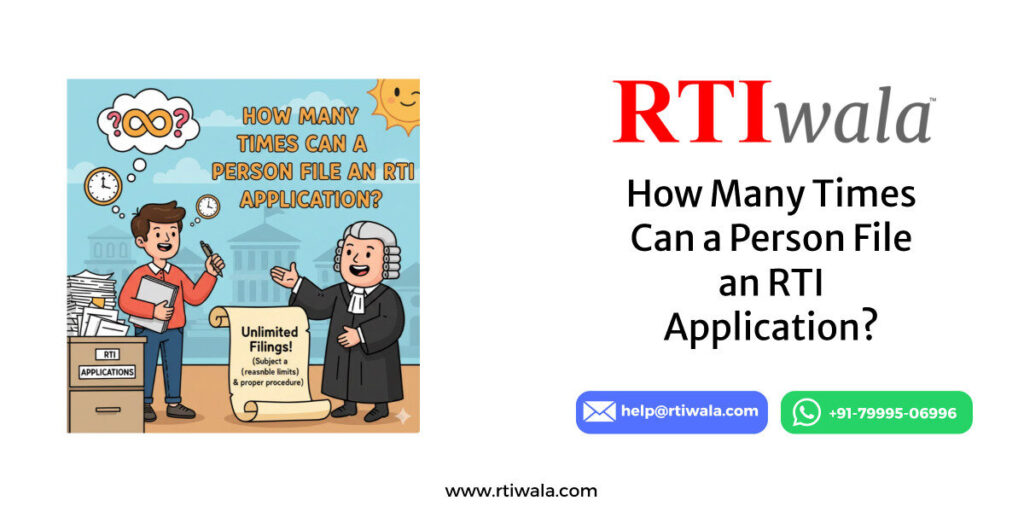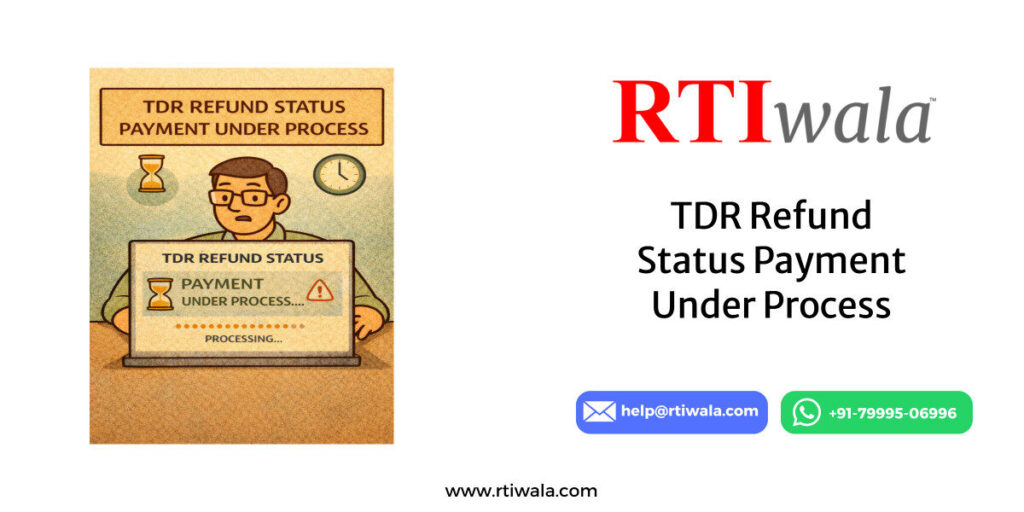Table of Contents
- Introduction
- Understanding the RTI Act and Its Importance
- Why File an RTI for Public Funds in Sports and Athletics?
- Step-by-Step Guide to Filing an RTI
- What Information Can Be Requested?
- Common Challenges and How to Overcome Them
- Examples of Successful RTI Applications in Sports
- How RTIwala Can Assist You
- FAQs
- Conclusion
Introduction
The allocation and use of public funds in sports and athletics is of great public interest. Transparency in how these funds are spent is essential to maintaining the integrity of sports programs and ensuring that resources are used efficiently and fairly. The Right to Information (RTI) Act empowers citizens to request and access information from public authorities. In this guide, RTIwala will walk you through the simple process of filing an RTI to obtain details about the use of public funds in sports and athletics, explained in clear and easy-to-understand language.
Understanding the RTI Act and Its Importance
The Right to Information Act, 2005, empowers Indian citizens to seek information from public authorities, thereby promoting transparency and accountability in the functioning of government bodies. By filing an RTI application, you can request details about the allocation, disbursement, and utilization of public funds in sports and athletics. This process helps ensure that public money is being spent appropriately and that there is no misuse or corruption involved.
Why File an RTI for Public Funds in Sports and Athletics?
Sports and athletics receive substantial funding from the government, both at the central and state levels. These funds are meant to support various activities, such as infrastructure development, training programs, athlete welfare, and organizing sports events. However, concerns often arise about whether these funds are being used effectively and transparently. Filing an RTI can help you obtain detailed information on how these funds are being utilized, ensuring accountability and encouraging better governance.
Step-by-Step Guide to Filing an RTI
Identify the Public Authority
The first step in filing an RTI is to identify the correct public authority that holds the information you seek. In the case of sports and athletics, this could be the Ministry of Youth Affairs and Sports, state sports departments, or specific sports federations and associations.
Drafting Your RTI Application
When draft your RTI application, be clear and specific about the information you are requesting. For example, you might ask for:
- Details of the funds allocated for a particular sports event or program.
- The criteria used for the allocation of funds.
- The list of beneficiaries of sports funds, including athletes, teams, and organizations.
- Copies of financial statements and audit reports related to the use of public funds in sports.
Ensure that your questions are concise and to the point. If needed, you can ask multiple questions in a single application.
Submitting the RTI Application
Once your RTI application is ready, you can submit it either online or in person. Most government departments now offer an online RTI filing portal where you can submit your request digitally. If submitting in person, visit the public authority’s office and submit your application along with the prescribed fee.
Following Up on Your RTI Request
After submitting your RTI application, the public authority is required to respond within 30 days. If you do not receive a response or if the information provided is incomplete, you have the right to file a First Appeal. Following up ensures that your request is taken seriously and that you receive the information you need.
What Information Can Be Requested?
Through an RTI application, you can request a wide range of information related to the use of public funds in sports and athletics, including:
- Allocation and disbursement of funds for specific sports programs or events.
- Details of contracts awarded for sports infrastructure development.
- Expenditure reports and financial statements.
- Information on how funds are distributed among athletes, teams, and sports associations.
- Copies of agreements and MoUs related to sports funding.
Common Challenges and How to Overcome Them
Filing an RTI can sometimes present challenges, such as:
- Delayed Responses: Public authorities may delay providing the requested information.
- Incomplete Information: The information provided may be partial or vague.
- Rejection of Application: In some cases, the RTI application may be rejected on various grounds.
To overcome these challenges, it’s important to be persistent and well-informed about your rights under the RTI Act. If your application is rejected or if you receive an unsatisfactory response, you can file an appeal with the appellate authority.
Examples of Successful RTI Applications in Sports
Several RTI applications have successfully brought transparency to the use of public funds in sports. For instance:
Case Study 1: An RTI application filed by a citizen revealed discrepancies in the allocation of funds for a state-level sports event, leading to an investigation and corrective measures.
Case Study 2: Another RTI application uncovered the mismanagement of funds in a government-sponsored athlete training program, resulting in improved oversight and accountability.
These examples demonstrate the impact that a well-filed RTI application can have on ensuring transparency in the sports sector.
How RTIwala Can Assist You
Filing an RTI application can be a complex process, especially when dealing with government departments. RTIwala offers expert assistance to help you file your RTI application accurately and efficiently. Whether you need help drafting your application, submitting it online, or following up on your request, RTIwala is here to support you every step of the way.
FAQs
Q1: Can I file an RTI to obtain details about the funding of a specific sports event?
Yes, you can file an RTI to request detailed information about the allocation and use of public funds for a specific sports event.
Q2: What if my RTI application is rejected?
If your RTI application is rejected, you have the right to file an appeal with the appellate authority. You can also seek assistance from RTIwala to ensure your application is processed correctly.
Q3: How long does it take to receive a response to an RTI application?
Public authorities are required to respond to RTI applications within 30 days. However, delays can occur, so it’s important to follow up if you don’t receive a timely response.
Q4: Can I request information on the salaries of officials involved in sports administration?
Yes, you can request information on the salaries and other remunerations of officials involved in sports administration as it pertains to public funds.
Q5: How can RTIwala help me file an RTI for sports funding information?
RTIwala provides expert assistance in drafting, filing, and following up on RTI applications, ensuring that you receive the information you need in a timely and efficient manner.
Conclusion
The Right to Information Act is a powerful tool for promoting transparency and accountability in the use of public funds in sports and athletics. By filing an RTI, you can access crucial information that ensures public money is being used effectively and fairly. Whether you’re concerned about the funding of a specific sports event, the development of sports infrastructure, or the allocation of resources to athletes, RTI can help you obtain the answers you need. For expert assistance in filing your RTI application, contact RTIwala today and make a positive impact on the transparency of sports funding in India.





















































